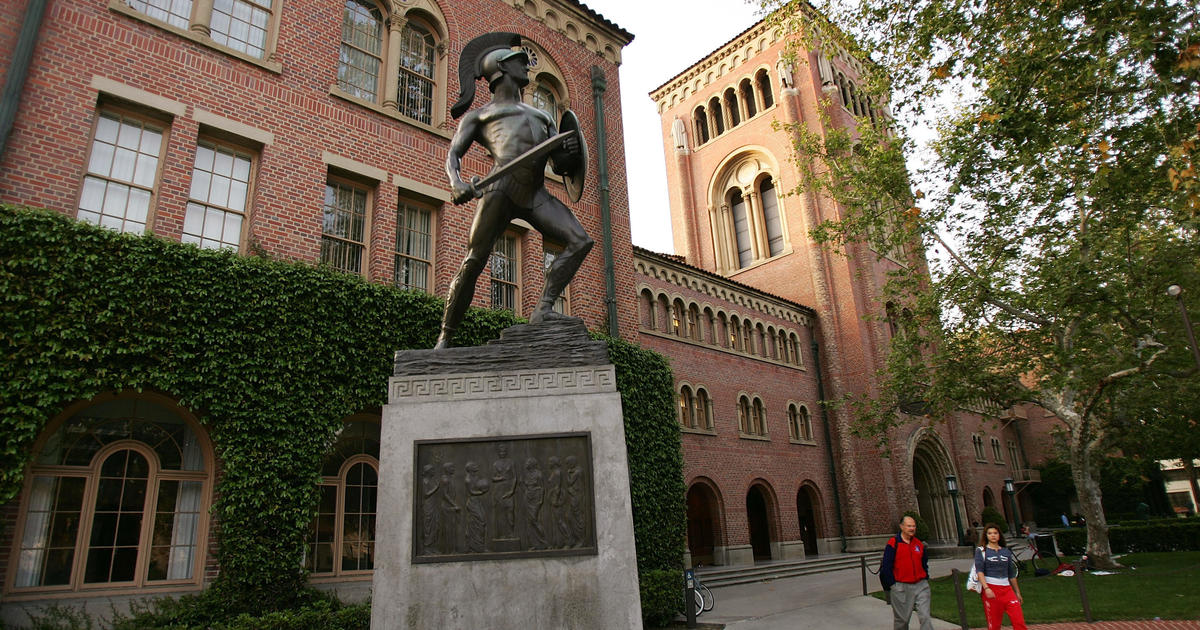Forty-five coronavirus cases at the University of Southern California have been connected to three fraternities associated with the school, according to the Los Angeles Department of Public Health. The health department, which is now investigating the outbreak, said in a statement to CBS News that it “may be linked to a large social gathering on July 4th.”
USC first identified a cluster of about 15 cases along its fraternity row in a campus health alert on July 9. At the time, the school said “patients with confirmed positive tests” were in self-isolation at home or “in the process of being privately transported to isolation.”
Dr. Sarah Van Orman, chief health officer for USC Student Health, however, wrote in a July 16 university advisory that the school was seeing “worrisome trends emerge” from its smaller summer population.
“Recent student exposure and illness has been traced back to group gatherings,” Van Orman wrote. She noted there had been no transmission among students living in residence halls.
According to Van Orman, the school’s positivity rate increased from 5% to 9% among students during the first two weeks of July. “Most of these cases are attributed to congregate living environments in private residences and group gatherings, especially over the Fourth of July weekend,” she wrote.
School officials said that while the outbreak affected fraternity houses, it wasn’t clear if those with the virus were members of fraternities or people who leased out rooms during the summer.
In response to the pandemic, the school has moved the vast majority of classes online, canceled events, limited on-campus housing, and added mask requirements as well as social distancing and symptom-checking measures, CBS Los Angeles reports.
The school has reported a total of 60 COVID-19 cases among students since July 5.
No new cases have been reported in the last week, leading school officials to believe the outbreak is over, CBS LA reports.
As of Thursday, the Los Angeles Department of Public Health has confirmed 41 new deaths and 2,628 new cases of COVID-19 across the county, according to a press release. In total, it has identified 185,872 positive cases of COVID-19, and 4,552 deaths due to the disease.
California currently leads the country for the largest number of confirmed COVID-19 cases, according to data collected by Johns Hopkins University. There have been 492,934 confirmed cases and 9,026 deaths in California as of Friday, with by far the largest concentration — 186,036 confirmed cases, and 4,559 deaths — located in Los Angeles.
Gatherings of people from different households are currently prohibited under the county’s Health Officer Order for the control of COVID-19.
“These are high-risk situations where COVID-19 can spread quickly to many people,” reads the health department’s statement regarding the USC outbreak. “Those people, even if they are asymptomatic, can then spread it to their household, which may include someone who becomes seriously ill or who may die.”
“As we have seen, people’s health, people’s livelihoods, and people’s lives are at stake.”
COVID-19 Daily Update:
July 30, 2020
Cases: 2,628 (185,872 to date)
Deaths: 41 (4,552 to date)
Current Hospitalizations: 2,022 pic.twitter.com/OCnp8RLDxR— LA Public Health (@lapublichealth) July 31, 2020
USC is not the only university that has seen cased linked to fraternity houses. Earlier this month, more than 100 students living in fraternity houses near the University of Washington campus reported testing positive for COVID-19. The Interfraternity Council, a student-led governing board for UW fraternities, said that at least 105 residents living in 15 fraternity houses have self-reported that they tested positive, CBS affiliate KIRO-TV reported.
The university, located in Seattle, learned Saturday that some fraternity residents had symptoms of COVID-19, and public health officials noticed a spike in cases among people ages 18 to 20, according to university spokeswoman Michelle Ma.
Daniel Leifer, a pediatrician studying dermatology at UW, estimated that he saw about a dozen parties when walking by Greek Row in recent months. Students stood close together, and masks were nowhere to be seen, he said.
“Unless all of us understand that right now our only tools are physical distancing and wearing masks, we’re going to continue to have devastation, not only in terms of the economy, our learning, our academics, our jobs, but people dying,” Van Orman told the Los Angeles Times.
“Each of us have to decide what we stand for. Frats need to do that as well.”
